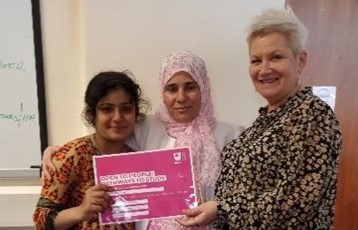From November 2021 to May 2022, the Open University (OU) in Scotland ran a study skills programme online for forced migrants in Glasgow. Over a series of blog posts, we hope to share some of the learning from that pilot which may be useful for organisations considering online or blended delivery of a similar programme.
Background and context
The OU in Scotland had hosted a roundtable event in January 2021, bringing together Scottish universities, the Universities of Sanctuary initiative and third sector organisations supporting forced migrants, with the aim of exploring ideas for collaboration and innovation with this group of learners. One of the recommendations from the event was to develop provision for skills that forced migrants would need for studying online. The OU in Scotland, with its long experience of delivering online and distance higher education, was considered to be best placed to lead on this recommendation.
The pilot was led by the OU in Scotland’s Access Participation and Success (APSS) team with input from academic colleagues. The authors of this blog are Gill Ryan, former manager of the APSS team and one of the creators of the Refugee Learning Stories blog, and Dr Sylvia Warnecke, Associate Head of School, Faculty of Wellbeing, Education and Language Studies at the OU, who contributed to the design of the programme’s curriculum.
Partnerships
We worked in partnership with The Scottish Refugee Council and Bridges Programmes, Glasgow to co-design the programme and to recruit participants. We also partnered with Connecting Scotland, a Scottish government-funded initiative to address digital inequality, to ensure learners had the digital devices and internet access they would need to participate.
The pilot built on a previous partnership between the OU in Scotland and Bridges Programmes. This model had used a blended approach which involved an OU tutor being co-located in Bridges’ offices one afternoon a week. Due to the extended impact of the Covid-19 pandemic, the partners were still operating remotely at the outset of the project so this pilot was delivered entirely online.
Programme design
The pilot comprised 18 weekly, synchronous, online sessions led by OU tutors, intended to build learners’ confidence in learning online and to develop the study skills they would need for higher education. Between sessions, participants undertook self-guided study using open educational resources (OER) on the OU’s free learning platform OpenLearn. The partner organisations offered additional support to their learners throughout the programme, though their approaches and level of support differed.
The programme design was underpinned by a pedagogy of care (Bali, 2020) and support for learners was built into the design in a number of ways:
- Provision of laptops and Mi-Fi to address digital poverty and inequality.
- Flexibility in the timing of the sessions. Recognising that participants may have work, childcare or caring commitments, we ran a choice of sessions: Wednesday evenings or Thursday mornings.
- Regular 1:1 sessions with tutors, to provide opportunities to identify and review learner goals and what support they may need to achieve them.
- Tutor autonomy to respond to the needs and goals of the learners in their session planning.
- Additional support between tutor-led sessions facilitated by the partners for their learners.
At the outset of the pilot, 22 learners had been identified and recruited by the partner organisations. Learners were recruited regardless of their legal status so the programme was inclusive of asylum seekers. We didn’t ask for evidence of previous educational attainment and relied on the partners’ knowledge and participants’ self-reporting of their proficiency in English.
Learners were split across two cohorts, choosing to attend either an evening or a morning session for 18 weeks. After the sessions ended in April 2022, learners were offered an information, advice and guidance (IAG) session with our educational advisors to discuss formal study with the OU, which took place in May. Eleven learners (50% of the initial cohort) completed the programme.
Anticipated outcomes from the pilot
By the end of the pilot programme the participants were expected to be able to:
- Access and navigate OpenLearn confidently
- Develop independent study skills
- Identify and use appropriate sources
- Use tutor feedback to improve their writing
- Write, edit and reference a short academic essay (250 words)
- Manage their study time
- Collaborate with others online
- Identify where and how to access support for study
- Reflect on what they’ve learned
- Identify appropriate next steps in their learning journey
How we measured outcomes
We collected data from participants throughout the programme via three 1:1 meetings with their tutor. These recorded progress against the outcomes above and the goals that participants set for themselves.
At the end of the programme, we followed up with a survey for learners and an invitation to interview. We also sought feedback from partners, tutors and OU in Scotland staff involved in the programme’s design and delivery, to gain a holistic picture of the pilot’s impact.
Over a series of blog posts published for Refugee Week 2023, we will address some of the learning from this evaluation under the headings:
Digital literacies and inequalities
Bali, M. (2020). Pedagogy of care: Covid-19 edition. Online (accessed 10 May 2023).

